December 24, 2025 | 17:07 GMT +7
December 24, 2025 | 17:07 GMT +7
Hotline: 0913.378.918
December 24, 2025 | 17:07 GMT +7
Hotline: 0913.378.918
These achievements were showcased during a trip to Vinamilk's Green Farm in Tay Ninh for a delegation of over 30 experts and professionals in sustainable development from leading Vietnamese businesses and organizations. The event, called "Sustainability Connect Trip & Talk," was organized by the Vietnam Business Council for Sustainable Development (VBCSD-VCCI) and focused on the inspiring theme: "Unlocking Nature, Sustainable Development."
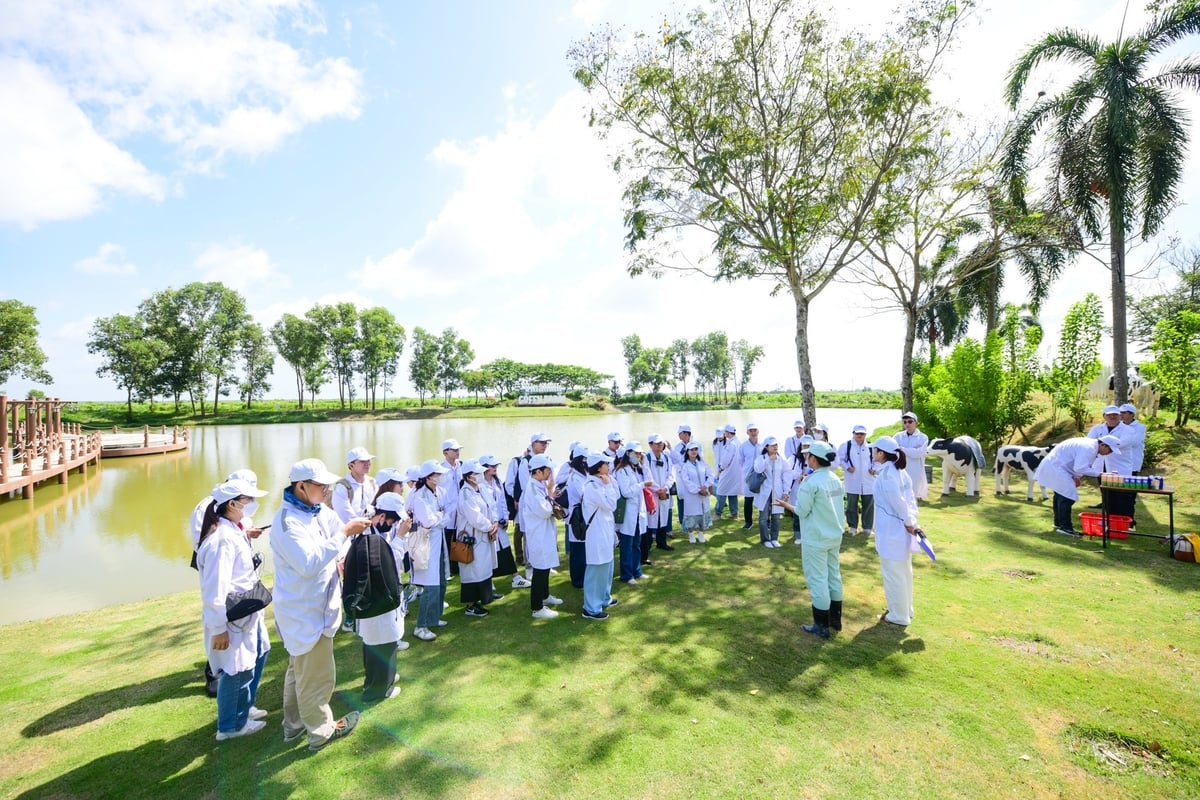
More than 30 experts and personnel working in the field of sustainable development at many leading enterprises and units in Vietnam visited Vinamilk's Green Farm Tay Ninh. Photo: Quang Dinh.
Although the farm regularly hosts international visitors, this time the Green Farm story was told from a new perspective. Electric vehicles carried the delegation to the breeding areas, cultivation plots, and waste treatment facilities, where they saw firsthand how Vinamilk "unlocked" nature. They witnessed how the company transformed a sunny, arid, and barren region into a "dairy cow resort" through a sustainable development strategy.
Many questions about this journey were answered by the employees who work directly on the farm. Nguyen Van Minh, head of the cultivation department at Vinamilk Green Farm Tây Ninh, pointed to the vast Mombasa grass fields and introduced us to the 500 hectares of fertile land, which is certified to the stringent European Organic standard.
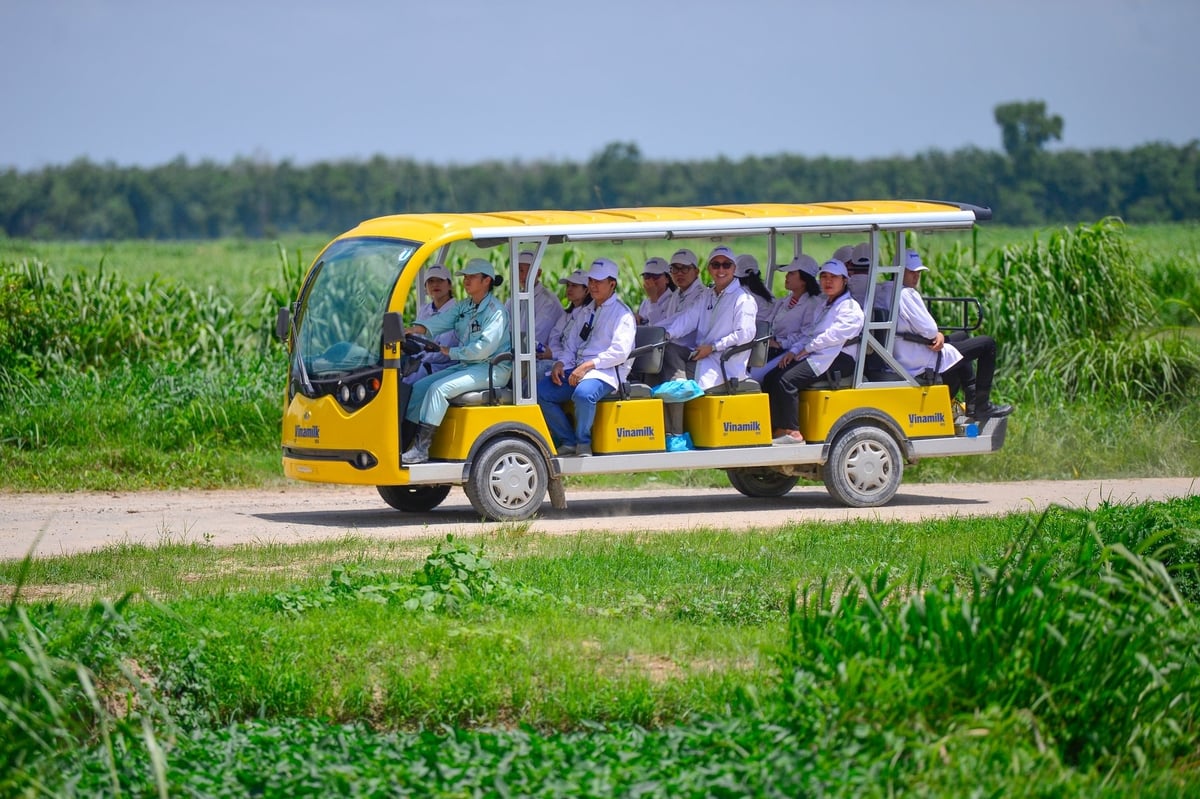
Experts learned firsthand how Vinamilk 'unlocked' nature, turning a barren, windy land into a farm dubbed a 'dairy resort'. Photo: Quang Dinh.
Minh mentioned the number "three years," which surprised many. This was the time Vinamilk allowed the land to rest and purify itself of residual substances, returning to its most natural state. During this period, agricultural experts from Vinamilk and Japan "ate and slept" with the land to understand it thoroughly.
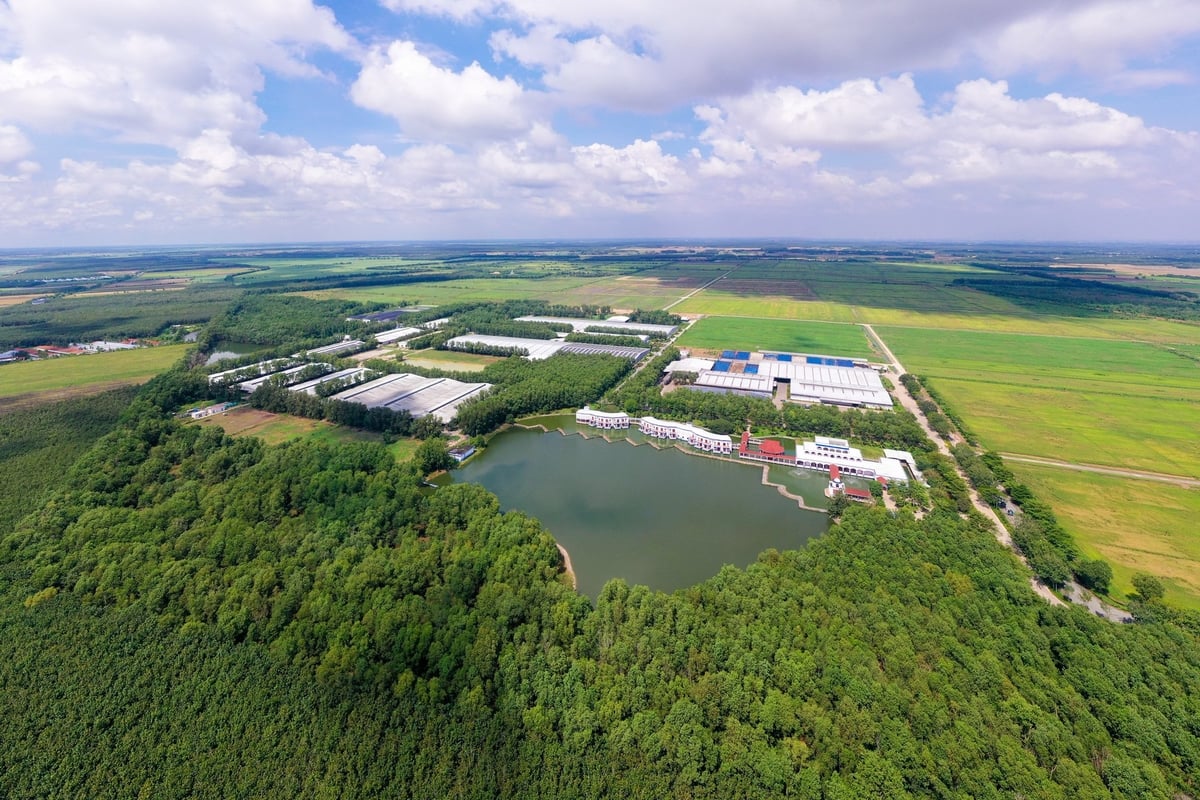
Green Farm Tay Ninh has 500 hectares of fertile land, meeting Vinamilk's European Organic standards. Photo: Vi Nam.
Animal waste, a persistent problem for many livestock models, has become "black gold" for soil improvement. Minh took us to a vehicle carrying treated organic fertilizer and picked up a handful of cow manure that had been composted for at least 15 days. He invited everyone to feel the fertilizer, which was completely dry and odorless. A soil cycle has been established, and the company plans to introduce software soon to assess soil health.
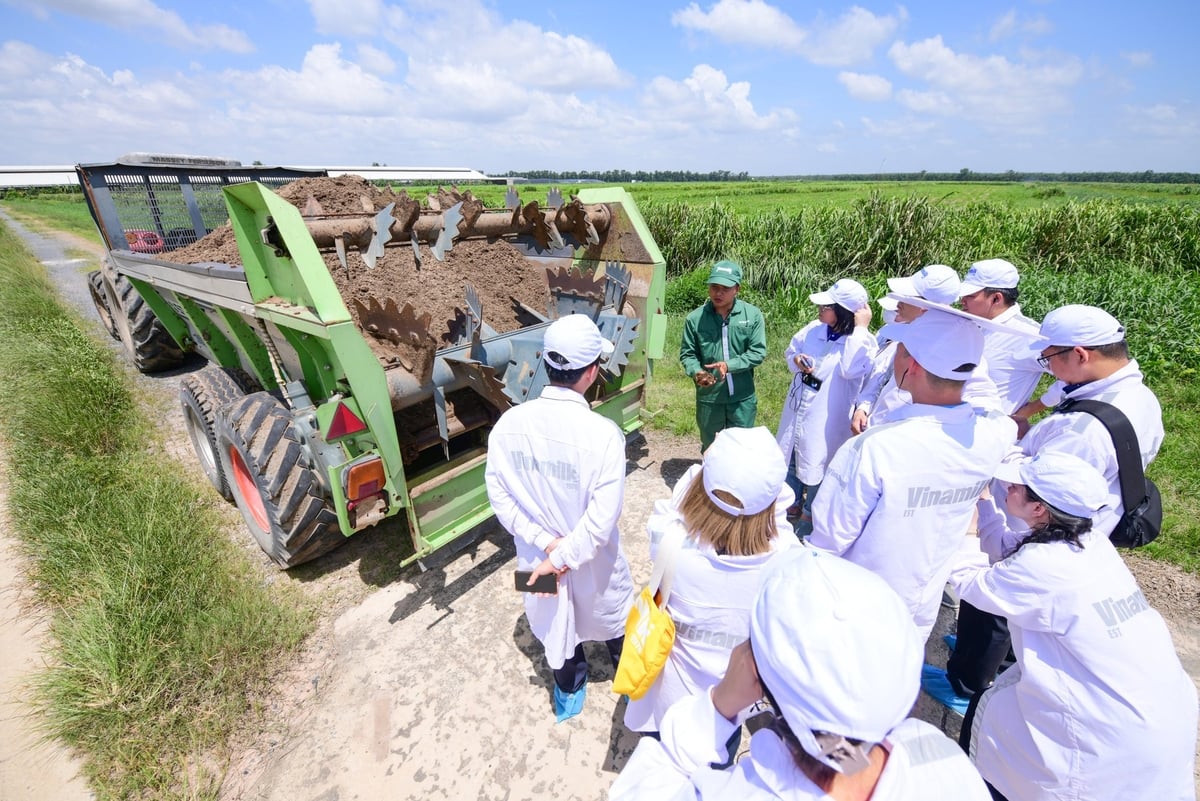
Vinamilk 'magically' turns livestock waste into 'black gold' to improve soil. Photo: Quang Dinh.
According to Nguyen Quynh Nga, Deputy Director of the VCCI Office for Sustainable Business, the practices at Vinamilk Green Farm Tây Ninh are a prime example of the "unlocking nature" approach. This method turns climate challenges into opportunities, creates a closed-loop green cycle, and spreads benefits to the community. Nga emphasized, "Vinamilk has proven that nature is not an obstacle but a key that helps us solve challenges related to food security and international competitiveness for Vietnamese agriculture."
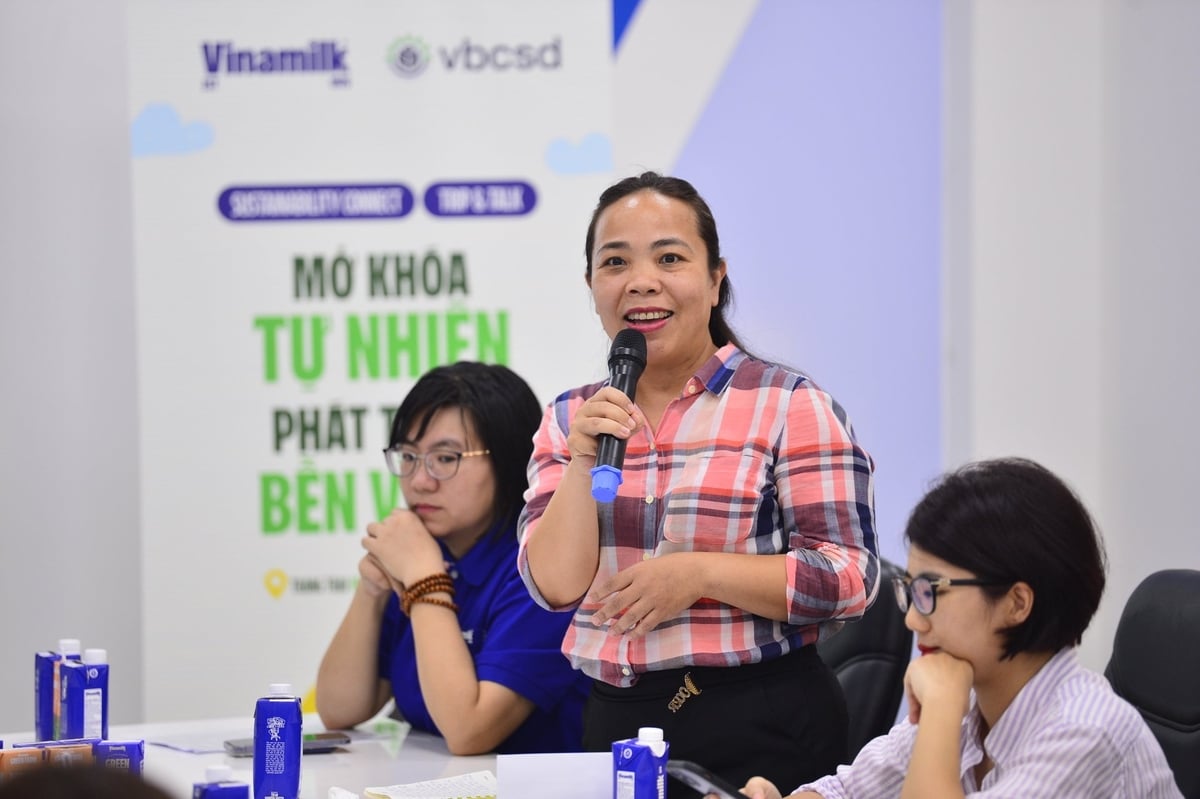
Ms. Nguyen Quynh Nga, Deputy Director of the Office of Enterprises for Sustainable Development of VCCI, said that Green Farm Tay Ninh is a specific example of the approach of 'unlocking' nature, turning climate barriers into opportunities, creating a closed green cycle and spreading benefits to the community. Photo: Quang Dinh.
Leaving the fields, still amazed by the organic farming process, the delegation observed the waste management system more closely. People were surprised by how "clean" the process was, as almost nothing was wasted.
In addition to turning 30–45 tons of cow manure daily into nutrient-rich organic fertilizer, the methane gas produced during the composting process is not wasted. Instead, it's collected in a biogas system. This renewable energy source is used to heat water, pasteurize milk for calves, dry staff clothes, dry grass, and power other equipment, saving over 100 million dong in electricity each month.
The delegation spent a considerable amount of time at the grass drying house, which uses a system invented by the farm's employees. Operating on the same principle as tea drying, fresh Mombasa grass can be dried to various levels to meet demand, achieving a quality comparable to imported grass. This allows the farm to be self-sufficient in producing its own dried grass at a cost of only about 2,000 dong per kilogram, which is more than 10 times cheaper than imported grass.
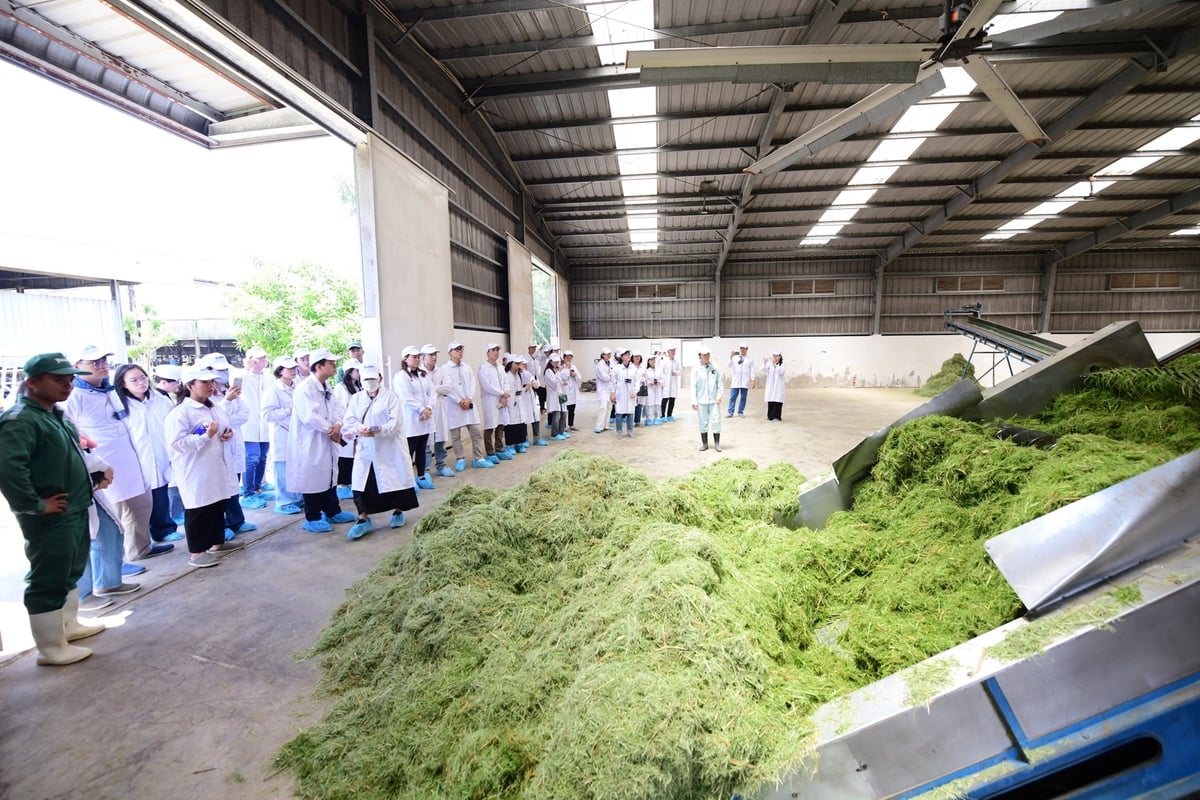
Grass dryer, a grass drying system invented by farm staff, is more than 10 times cheaper than imported grass. Photo: Quang Dinh.
"Freshly cut grass is dried for the cows and calves to eat throughout the day, ensuring it stays fresh and nutritious. Although the grass is dried in-house, it is still checked from the input stage to the final product before being sent to the 'kitchen' for food processing in a closed-loop process to ensure the health of the herd", said Kieu Linh, Director of Veterinary and Animal Husbandry.
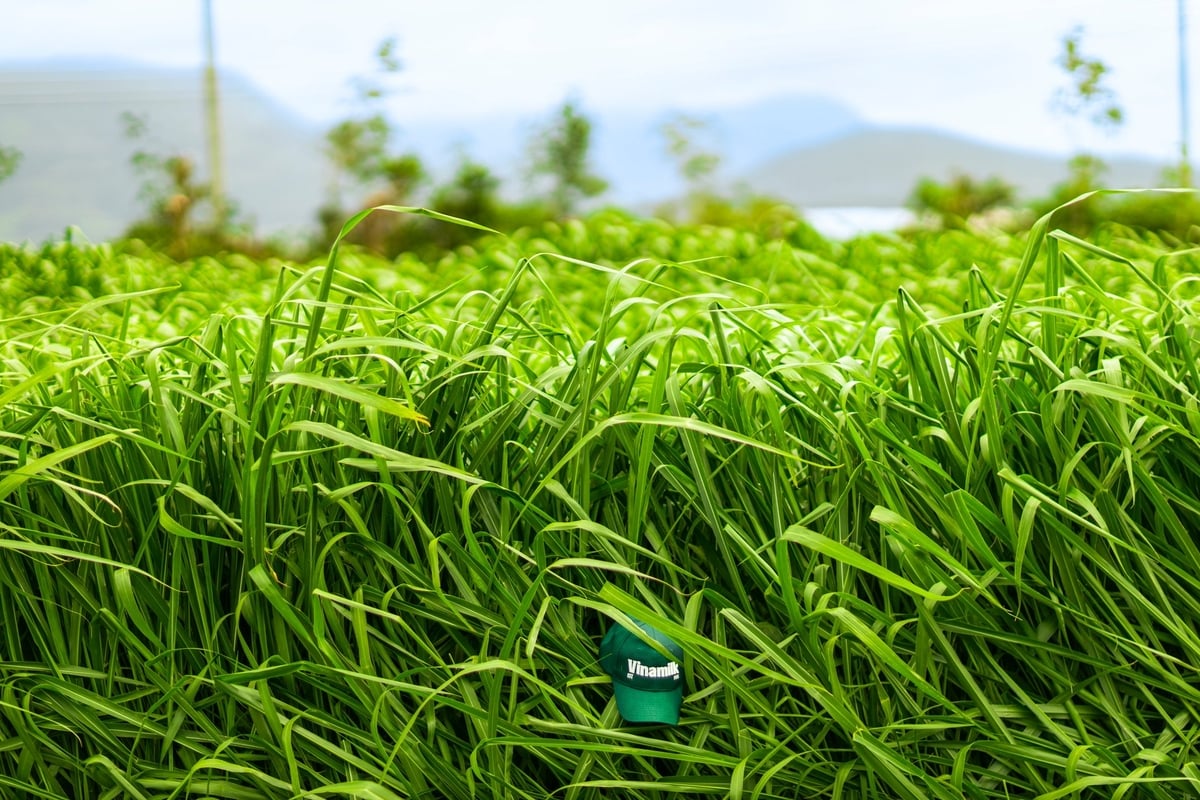
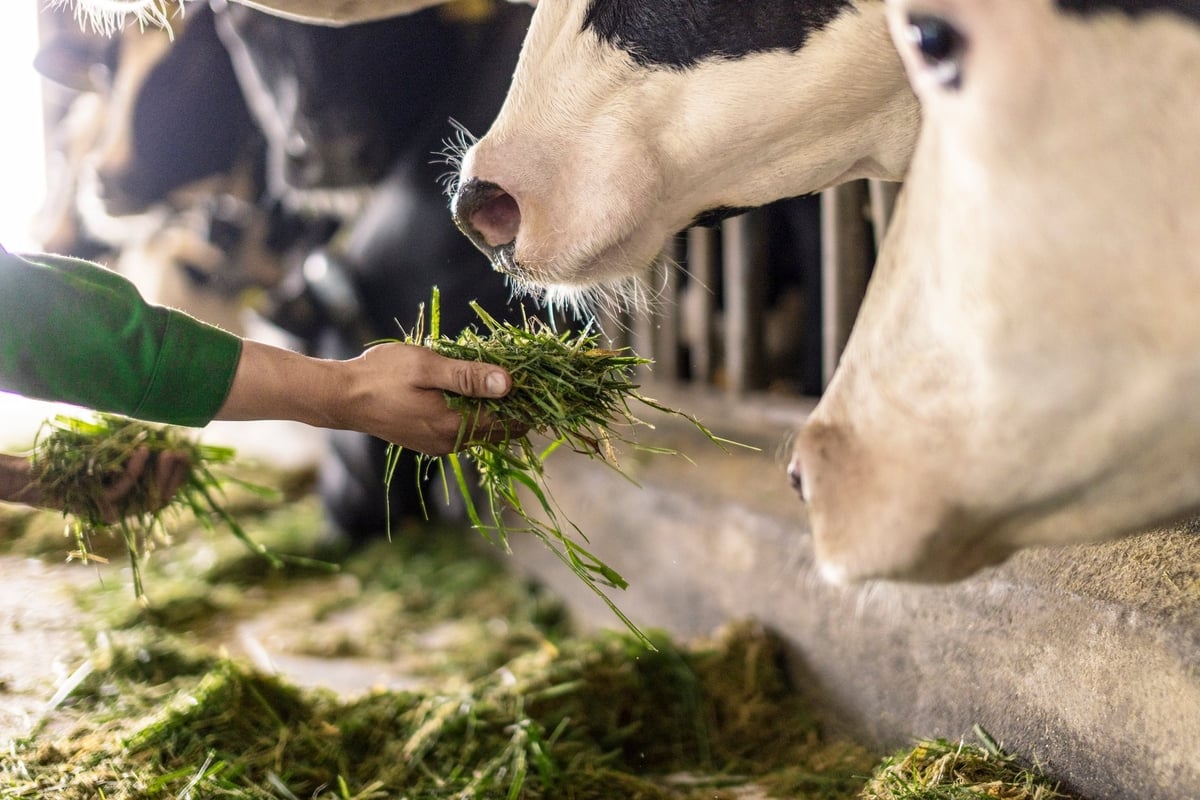
Freshly cut grass is dried to feed the calves during the day, always keeping it fresh and nutritious. Photo: Vi Nam.
After processing, the grass and corn are taken to the barns where the cows and calves are housed. This was perhaps the most anticipated part of the trip. Upon entering the barn, everyone agreed it was the "coolest" place on the farm, with temperatures consistently at 27-28°C and no unpleasant odors, even with a herd of nearly a thousand cows.
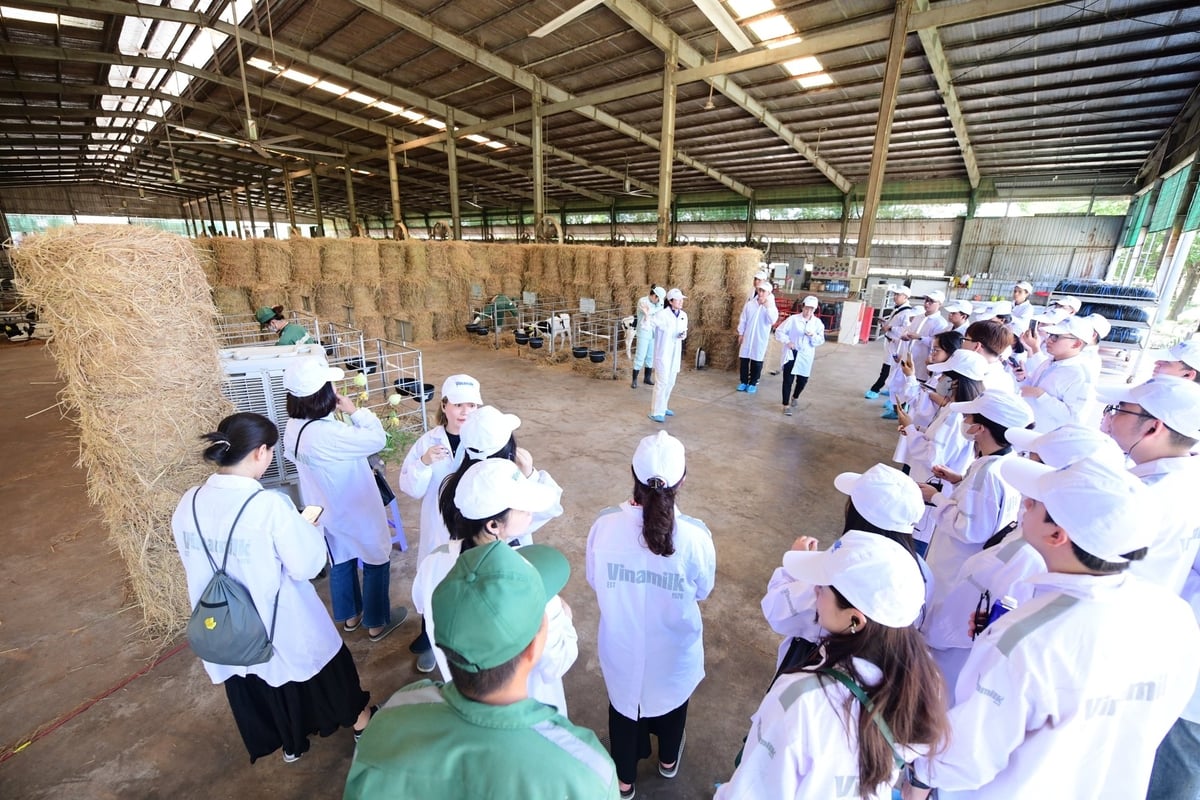
Stepping into the barn, everyone had the same feeling that this was the 'coolest place' on the farm, the temperature was always at 27-28 degrees Celsius and there was absolutely no smell. Photo: Quang Dinh.
This is all thanks to a cooling system with dozens of giant fans and a special barn design that ensures ventilation and airflow. An automatic misting system creates "artificial rain" every three minutes, lowering the temperature and reducing stress for the cows. The barn roofs are covered with solar panels, which both lower the temperature and provide clean electricity.
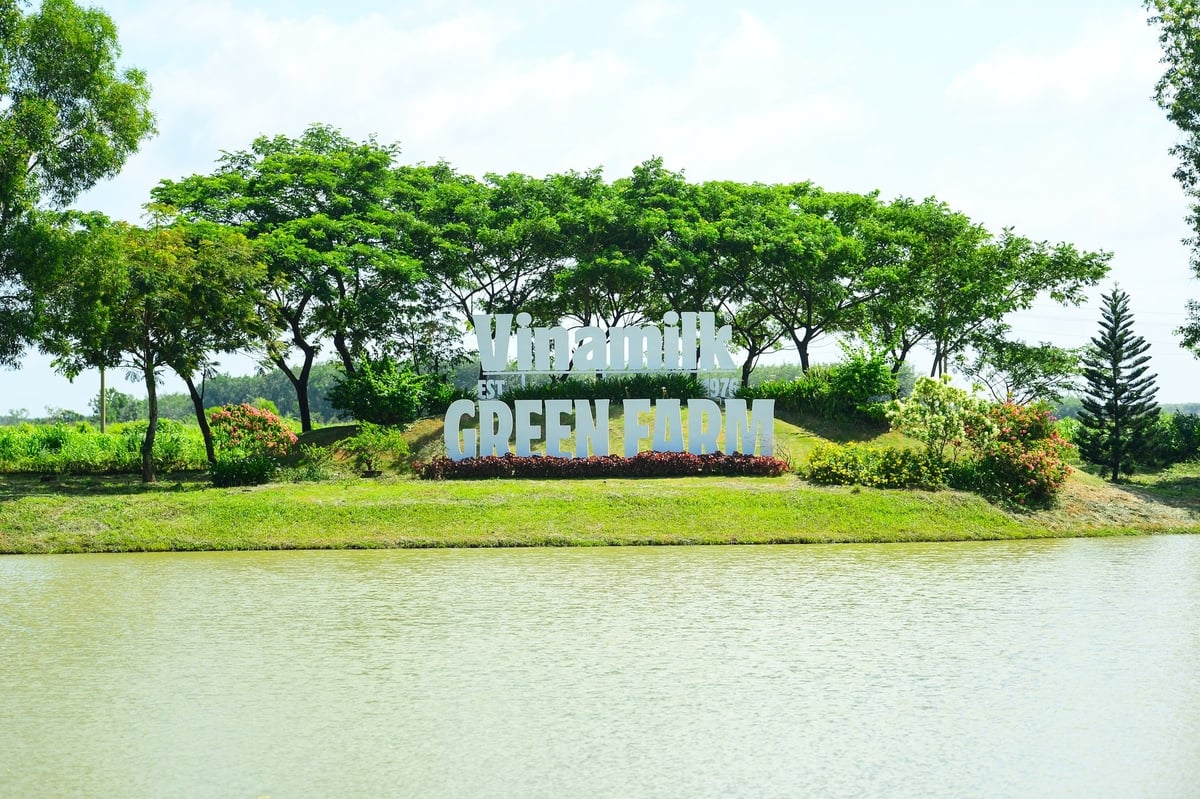
At Green Farm Tay Ninh, Vinamilk generously retains 9 lakes interspersed with green areas to store and circulate water... Photo: Quang Dinh.
It's not an exaggeration to call this place a "resort" for dairy cows. Instead of maximizing land use to expand the herd, Vinamilk has generously preserved nine lakes interspersed with green spaces. These lakes store water, ensure its circulation, and act as "air conditioners" and "humidifiers" to keep the air cool and comfortable for the cows, which thrive in temperate climates.
Vinamilk uses electronic chips to identify individual cows and monitor their health and activity, allowing for customized care plans. The feed is also managed by software, with rations adjusted according to age and condition, and a mix of more than 20 types of nutritious grains and grasses. Robots serve food, play relaxing music, and automatic massage machines provide "back scratches" when the cows approach.
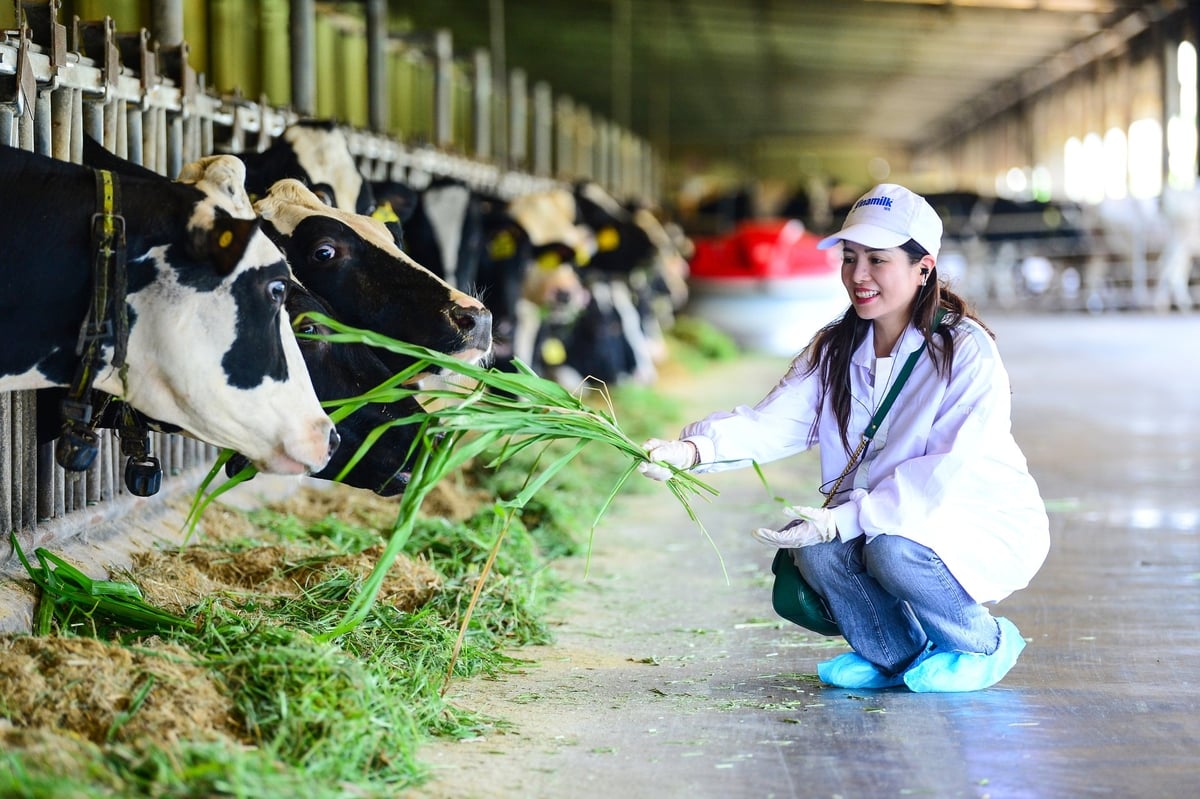
Although using a lot of modern 4.0 technology equipment, when taking care of dairy cows, the enterprise always focuses on the criterion of 'creating a living environment close to nature'. Photo: Quang Dinh.
Despite using a lot of modern "4.0" technology, Kieu Linh emphasized that the company's focus in cow care is always on "creating an environment that is close to nature, minimizing human intervention, and allowing the cows to rest, eat, and move according to their needs and natural habits".
What impressed many was not only the self-contained cycles for soil, water, and waste within the farm but also how Vinamilk has expanded this to the local community, creating a network of satellite farms developed sustainably.
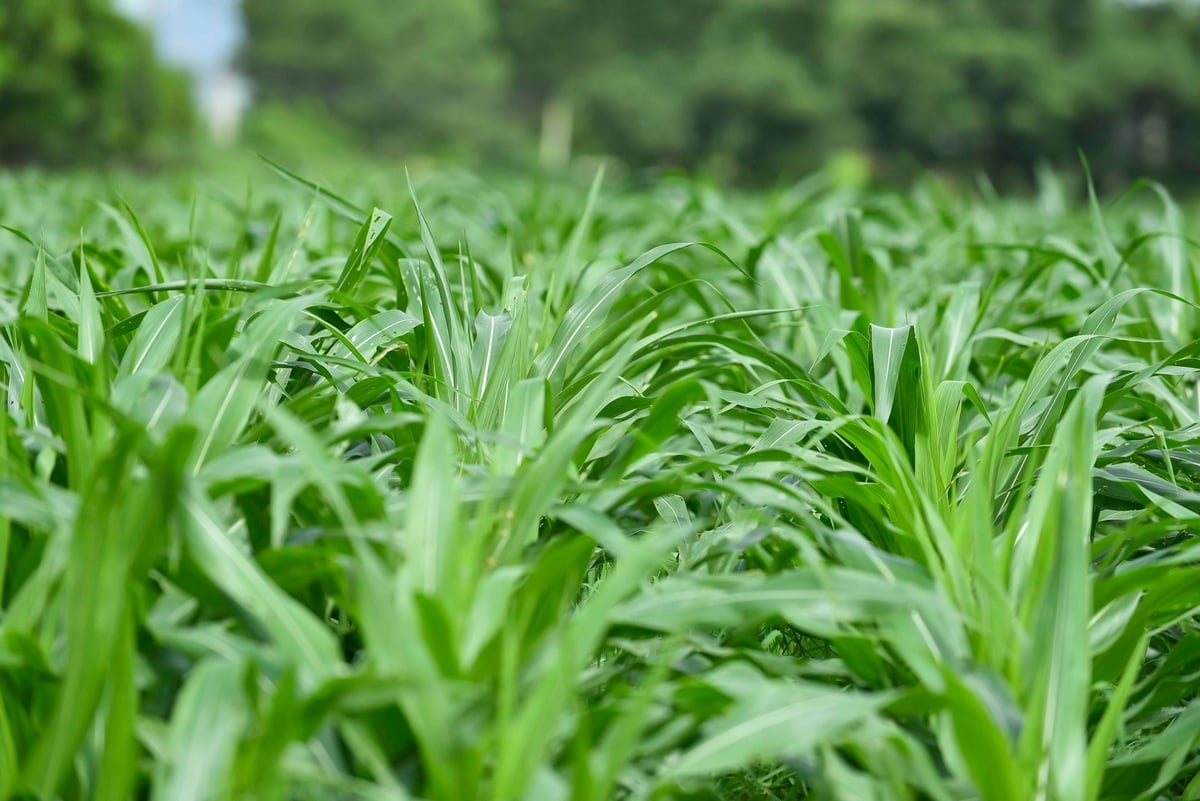
Vinamilk prioritizes 'real' reduction at the source, instead of compensating by buying carbon credits from outside. Photo: Vi Nam.
Organic fertilizer is provided to partner households, and farm staff are assigned to help farmers cultivate their land according to good agricultural practices, ensuring quality. In 2024, the company committed to purchasing over 365,000 tons of biomass corn from farmers, increasing their income. The local people have become a link in the sustainable value chain, benefiting from the partnership and becoming more deeply involved with the company.
Speaking on the topic of reducing greenhouse gas emissions, Nguyen Huynh Thanh Phong, Director of Sustainable Development at Bureau Veritas Vietnam, praised Vinamilk's priority on "real" reductions at the source, rather than offsetting with external carbon credits. He also noted their clear roadmap to achieve Net Zero by 2050.
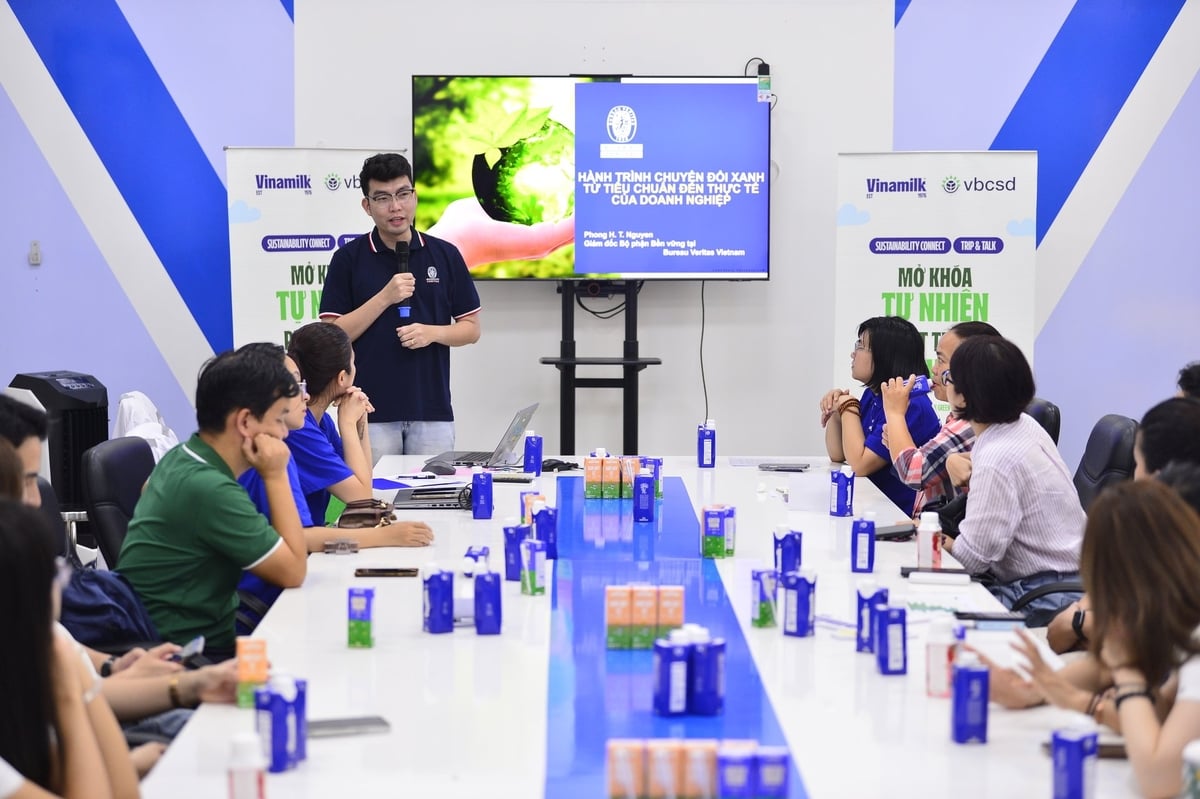
Mr. Nguyen Huynh Thanh Phong, Director of Sustainable Development of Bureau Veritas Vietnam, highly appreciated Vinamilk's priority in reducing waste at source. Photo: Quang Dinh.
Phong gave the example of the on-site grass drying initiative, which not only makes Vinamilk more self-sufficient but also controls and significantly reduces greenhouse gas emissions from production and transportation that would be involved with importing grass from abroad. He also noted that collaborating closely with local farmers will help Vinamilk better manage greenhouse gas emissions within its supply chain in the future.

Vinamilk's ecological farm system.
In an era where "sustainable development" will be a strategic keyword for many businesses, referencing Vinamilk's roadmap and approach can help other companies proactively implement international standards and, more specifically, ESG practices. These are becoming increasingly important in modern agriculture, allowing businesses to lead future trends where economic value goes hand in hand with sustainable development.
Translated by Linh Linh

(VAN) Two leading enterprises in the agricultural sector have officially cooperated to implement a sustainable value chain model for Viet Nam's shrimp industry.

(VAN) Dien Bien is speeding up ODA projects to respond to climate change and strengthen water management and disaster prevention infrastructure in pursuit of sustainable development.

(VAN) With high automation, large capacity, and a green development orientation, the Hai Duong Plant Branch is becoming an important anchor for the animal feed market.
/2025/12/01/2936-2-222331_70.jpg)
(VAN) Mortgaging his house and giving up a pharmaceutical management career, Mr. Nguyen Quang Duy succeeded in bringing Khanh Hoa's sea grapes to demanding markets such as Japan and the U.S.

(VAN) The large-scale agroforestry investment project aims to develop a leading sustainable agro-industrial center in Angola.
/2025/11/28/3433-1-212821_213.jpg)
(VAN) Many localities across the coconut land of Vinh Long are replicating emission-reducing models in production and daily life, contributing to the targets for emission reduction and green economic development.

(VAN) The green transition is an inevitable path for collective economy to achieve balanced growth and align with global trends.